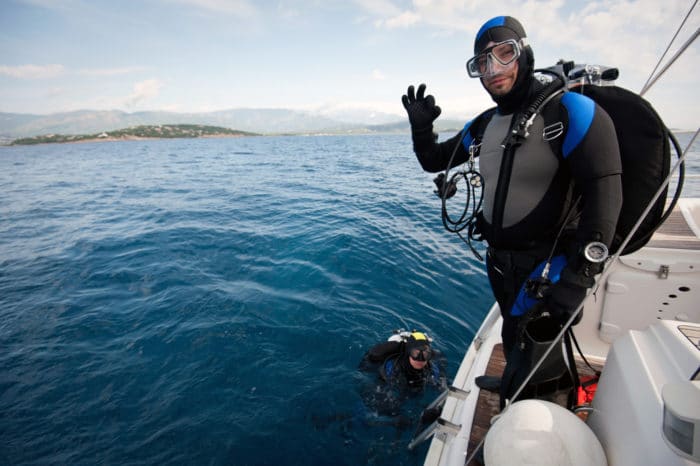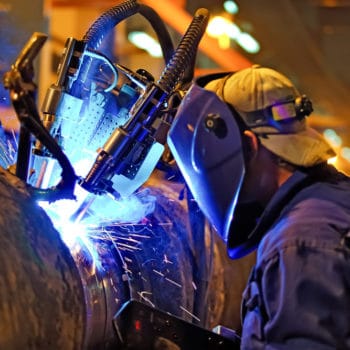Why We Love It
-
$54,640Potential Avg. Salary
-
36.4%Job Growth Rate
-
Growing DemandJob Outlook
-
InvestigativeCareer Attribute
Commercial divers are individuals who earn their living underwater. They may perform maintenance on oil rigs, take photographs of underwater lifeforms, help police conduct investigations, or conduct scientific research. They wear wetsuits and diving equipment and use a variety of tools.
Recommended Schools
What is a Commercial Diver?
The following job responsibilities are common for individuals in commercial diver roles:
- Navigate deep bodies of water to perform job responsibilities
- Wear heavy or constrictive diving and scuba equipment for underwater safety
- Work with hazardous materials while ensuring safety protocols are followed
- Work with a team of divers to complete job duties
A Day in the Life
Commercial divers can work in a number of fields, and the specific job responsibilities of a commercial diver vary greatly from role to role. One thing all commercial divers have in common is that they navigate deep bodies of water, using specialized equipment to ensure health and safety while they work. Professional divers use specialized scuba gear, wetsuits, oxygen tanks, and other tools to keep body temperatures from falling and to ensure they can continue breathing while performing their roles.
Some commercial divers work as maintenance or repair technicians; others are simply interested in underwater lifeforms. For example, the most common type of commercial diver is an offshore diver. These commercial divers work on underwater oil rigs, conducting maintenance and repairs of underwater equipment. Others may work as photographers—collecting images of underwater plant and sea life—or as scientists studying the ecology of the deep sea.
Commercial divers may be required to dive in a variety of different types of water—oceans, gulfs, rivers, lakes, and even man-made bodies of water. While many divers work in clean and safe bodies of water, HAZMAT divers conduct their work in toxic bodies of water that have been polluted by sewage, nuclear waste, oil sludge, or liquid cement. These divers must have special vaccinations and use special equipment to prevent exposure to the toxic materials they dive in.
Typical Work Schedule
There really is no typical work schedule for commercial divers. Offshore divers live on oil rigs and may be required to work overtime, any time of the day, any day of the week, and many days in a row without time off. Photography and research divers, on the other hand, may work more typical business hours and schedules. The work schedule is highly dependent on the employer and field of commercial diving.
Commercial Diver Specializations
- Offshore divers live on oil rigs far away from major land masses and conduct maintenance and repairs on portions of rigs that are housed deep within the sea.
- Inshore divers commonly work in freshwater bodies of water and commonly do underwater survey or repair work for structures like bridges and dams.
- HAZMAT divers dive in toxic substances like oil sludge, nuclear waste, or sewage and wear highly specialized protective equipment to prevent exposure.
- Diving photographers specialize in capturing underwater images of plants, fish, and other organisms that live underwater.
- Scientific divers conduct underwater research to learn more about life and lifeforms that live in deep bodies of water.
- Police divers conduct underwater searches to aid in police investigations.
- Military divers conduct underwater operations to perform tasks like diffusing mines or investigating enemy ships and submarines.
Typical Employers
The largest number of commercial divers are employed by oil companies to perform maintenance on offshore oil rigs. However, other employers of commercial divers include—but are not limited to—research facilities, federal, state, and local governments, magazines, and nuclear power plants.
Recommended Schools
How To Become a Commercial Diver
To obtain employment as a commercial diver, you’ll need to complete a postsecondary program at a commercial diving school. Some commercial diving programs are certificate programs, and other’s may lead to associate’s degrees. While studying to become a commercial diver, students will learn the basics of underwater safety, will become normalized to the pressure of being deep underwater, and will learn how to use welders and other tools that help divers perform underwater maintenance tasks.
If completing a commercial diving program did not result in the proper certification, aspiring commercial divers may also need to pursue certifications that will be needed to secure employment. Certifications ae awarded by organizations like the International Marine Contractors Association (IMCA), Association of Diving Contractors International (ADCI), and the American Welding Society (AWS), among others. With the appropriate education and certifications, aspiring commercial divers will qualify for open roles. Many begin their careers as offshore divers and progress over time into higher-paying roles.
Certain types of commercial divers will need more than just diving education. For example, many commercial diving photographers also pursue bachelor of fine arts degrees (BFAs) in photography. Scientific divers will likely need bachelor’s and graduate degrees in fields like biology or marine biology in addition to an education in commercial diving to qualify for open positions. Military divers, on the other hand, may receive on-the-job training in service fields like the Navy.
Commercial Diver Salary Data
We’ve provided you the following to learn more about this career. The salary and growth data on this page comes from recently published Bureau of Labor Statistics data while the recommendations and editorial content are based on our research.
National Anual Salary
Low Range
$38,330Average
$54,640High Range
$88,470National Hourly Wage
Low Range
$18/hrAverage
$26/hrHigh Range
$43/hrHow do Commercial Diver salaries stack up to other jobs across the country? Based on the latest jobs data nationwide, Commercial Diver's can make an average annual salary of $54,640, or $26 per hour. This makes it an Above Average Salary. On the lower end, they can make $38,330 or $18 per hour, perhaps when just starting out or based on the state you live in.
Salary Rankings And Facts
#330 Nationally for All Careers
Highest Education Among Commercial Divers
- 0.2% Doctorate
- 1.3% Masters
- 8.8% Bachelors
- 9.8% Associates
- 25.2% College
- 40.6% High School
- 14.1% Less than High School
Job Growth Projections and Forecast
2014 Total Jobs
4,4002024 Est. Jobs
6,000Job Growth Rate
36.4%Est. New Jobs
1,600How does Commercial Diver job growth stack up to other jobs across the country? By 2024, there will be a change of 1,600 jobs for a total of 6,000 people employed in the career nationwide. This is a 36.4% change in growth over the next ten years, giving the career a growth rate nationwide of Below Average.
Growth Rankings And Facts
#6 Nationally for All Careers
What Companies Employ The Most Commercial Divers
| Industry | Current Jobs | New Jobs Needed | % Increase |
|---|---|---|---|
| Other heavy and civil engineering construction | 1,100 | 700 | 1% |
| Self-employed workers | 700 | --- | --- |
| Support activities for water transportation | 100 | --- | --- |









